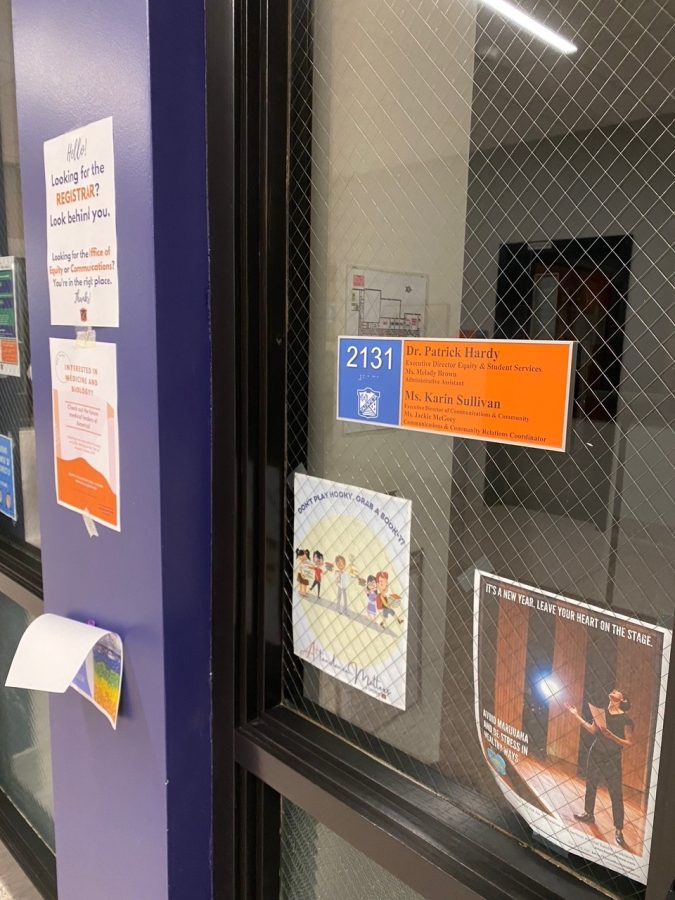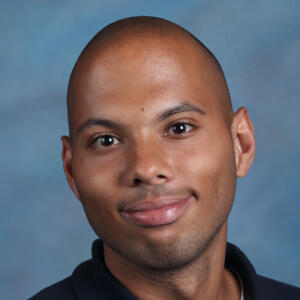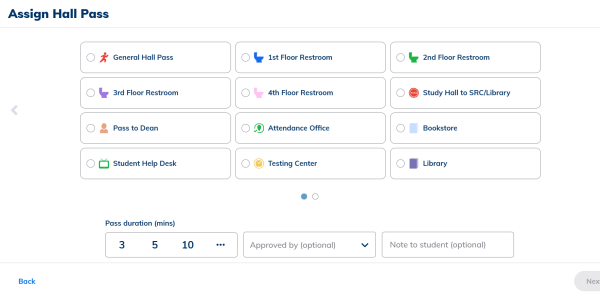Hardy steps down as equity director
Hardy’s office by the second floor balcony
After one year in the position, Patrick Hardy is stepping down as OPRF director of equity and student success. Hardy is the second person to step down from this position in the three years since the position’s inception. The first person to hold this position was LeVar Ammons.
The position was created in 2019 to help administer OPRF Board of Education policy 7:12, which was created to hold the district accountable for eradicating racially predictable disparities in achievement.
The director of equity is also responsible for coordinating Title IX within the district. Title IX is a federal civil rights law prohibiting sex-based discrimination in any school or other education program that receives funding from the federal government.
Before working at OPRF, Hardy was principal at Proviso East High School for six years. Hardy will return to a principal position, this time at Hinsdale South High School.
Hardy’s reasons for stepping down are complex. “I think I have more to offer public education than this job allows,” he said. “I believe there should be a focus on examining and developing healthy racial consciousnesses and improving students’ racial experiences.”
“I think I have more to offer public education than this job allows.”
—Patrick Hardy, outgoing equity director
Hardy explains his job is a balancing act. “I also think we must work to improve the data by which the state and public are judging us. There has to be a balanced, qualitative, and quantitative approach to the work, and I need a space that allows for both,” he said.
Every year, schools in the state of Illinois receive a report card like score from the state based on factors like graduation rate, attendance, and especially test scores. According to the Illinois Report Card, in 2021, 41.3% of white juniors at OPRF taking the SAT exceeded performance level, while only 5.9% of Black juniors at OPRF exceeded performance level.
“A huge part of my job is to assist the district in changing that data. So, if we’re not consistently talking about the data, how do I keep my job?” said Hardy. “Some people think that when you bring up the data, you are ignoring the qualitative stuff. You’re not. It does not have to be an ‘either-or’ proposition. That’s why I said it has to be a balance.”
“We will keep searching for someone who can help put these initiatives (the tenants of the job) into action. We are still setting up the system and change can be hard and tiring. We will get there though,” said Board of Education President Sara Spivy.
“Can you imagine the weight of any person, but certainly a Black male, whose job it is to challenge the institution’s racism every single day? There is a huge weight on that, and there is not a lot of support,” said Hardy.
Superintendent Greg Johnson recognizes the pressure and weight that can come with the director of equity position. “I think the first thing we have to do is absolutely recognize that is a challenge for anybody coming into this position, and we have to help them feel and be supported by their peers and by the overall administrative team and by the school at large on a regular basis,” said Johnson.
Hardy has “set up really solid goals and plans to help realize the racial equity policy that we have in place.”
—Greg Johnson, superintendent
Despite differences in approach, the Board of Education and the administration remain steadfast in their support of Hardy. “I have been impressed with him and thought he was well researched and frankly brilliant,” said Spivy.
“He has done an incredibly great job at organizing his own team… he has also set up really solid goals and plans to help realize the racial equity policy that we have in place,” said Johnson.
One of Hardy’s accomplishments this year was making the racial equity policy more digestible to the public. “There are 12 official indicators in the racial equity policy…Nobody knows what those are and nobody wants to read a 15-page document saying what they are,” said Hardy. “So we created this nice visual articulation of the job and what the work is and it’s called the framework. It’s part of the work and it was necessary to do so that the next person has a little bit more to stand on.”
“The fact that the role and policy exists says that someone way above my pay grade appropriately recognized that there are issues that center around race at this school,” said Hardy.






